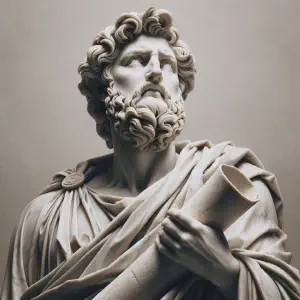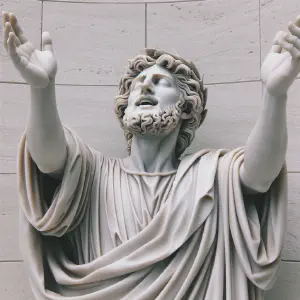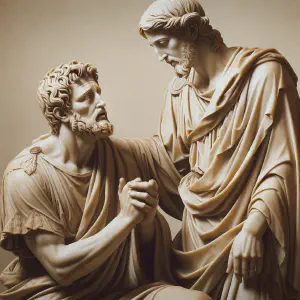The Journey of Faith

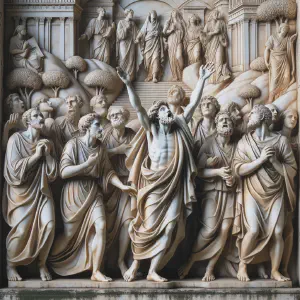
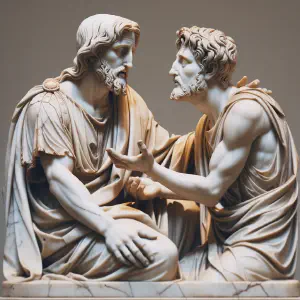
Thus, through the ages, the call to walk in the light of the LORD resonated, transcending boundaries and uniting diverse peoples in faith. From Isaiah’s vision to the Psalmist’s songs, and through the faith of a humble centurion, the journey of faith weaves a tapestry of hope, peace, and divine communion. It is a journey that invites all, regardless of origin, to partake in the eternal banquet with the forefathers, a journey that continues to beckon hearts towards the everlasting light of the LORD.
Five Questions
What does Isaiah’s vision in Isaiah 2:1-5 represent in the context of faith and spirituality?
Isaiah’s vision symbolizes the ultimate gathering of all nations under the light and wisdom of God. It’s a prophetic image of unity, where people from diverse backgrounds come together in peace to learn from the Lord. This vision extends beyond the physical realm, emphasizing a spiritual journey towards understanding and living according to God’s ways. It’s a powerful message about the universal nature of God’s invitation to all humanity to seek and embrace His teachings.
How does the Psalmist’s joy in Psalms 122:1-9 relate to our modern spiritual journey?
The Psalmist’s joy reflects the deep emotional and spiritual fulfillment found in coming into the presence of God. In today’s context, it encourages us to eagerly participate in communal worship and spiritual gatherings, finding joy and unity in our shared faith. It’s a reminder that our journey to God is not solitary but is enriched by our collective experiences and expressions of faith within our communities.
What can we learn from the centurion’s faith in Matthew 8:5-11?
The centurion’s faith demonstrates a profound understanding of Jesus’ divine authority, transcending physical limitations. His belief that Jesus could heal his servant just by speaking shows a remarkable trust in Jesus’ power. This teaches us about the depth and simplicity of true faith – it’s not about our physical proximity to the divine, but our spiritual openness and trust in God’s power. The centurion’s faith is a model for us, showing that humility and belief can lead to great miracles.
How do these scriptures collectively guide us in addressing contemporary issues like war and division?
These scriptures collectively call us to a higher standard of living that transcends the divisions and conflicts of our world. Isaiah’s vision of turning weapons into agricultural tools is a powerful metaphor for transforming our means of conflict into means of nurturing and supporting one another. The Psalmist’s call for unity and the centurion’s example of faith across cultural divides remind us that true peace and progress come from understanding, compassion, and a shared belief in a higher purpose. They encourage us to work towards a world where differences are resolved through dialogue and mutual respect, underpinned by a common commitment to peace and spiritual values.
What is the overarching message of these readings for a believer’s life?
The overarching message is one of hope, unity, and the transformative power of faith. These readings encourage believers to look beyond the surface differences that divide us, focusing instead on the shared journey towards understanding and living in accordance with God’s will. They teach us that faith is not just a personal journey but a collective experience that can bring about profound change in the world. Through faith, we are invited to participate in building a future where peace, understanding, and compassion are the cornerstones of our collective existence.
Bible Study
Isaiah 2:1-5
This is what Isaiah, son of Amoz,
saw concerning Judah and Jerusalem.
In days to come,
The mountain of the LORD’s house
shall be established as the highest mountain
and raised above the hills.
All nations shall stream toward it;
many peoples shall come and say:
“Come, let us climb the LORD’s mountain,
to the house of the God of Jacob,
That he may instruct us in his ways,
and we may walk in his paths.”
For from Zion shall go forth instruction,
and the word of the LORD from Jerusalem.
He shall judge between the nations,
and impose terms on many peoples.
They shall beat their swords into plowshares
and their spears into pruning hooks;
One nation shall not raise the sword against another,
nor shall they train for war again.
O house of Jacob, come,
let us walk in the light of the LORD!
This passage presents Isaiah, a major prophet in the Old Testament known for his prophecies about the coming of the Messiah and the salvation of the Lord. Isaiah’s vision of the mountain of the Lord as the highest and the gathering of nations symbolizes the universal call to salvation and the establishment of God’s kingdom. It aligns with Catholic values of peace, as seen in the transformation of weapons into tools of agriculture, and the universal call to the faith, resonating with the Church’s mission of evangelization and the teaching of Christ’s peace.
Psalms 122:1-9
R. Let us go rejoicing to the house of the Lord.
I rejoiced because they said to me,
“We will go up to the house of the LORD.”
And now we have set foot
within your gates, O Jerusalem.
R. Let us go rejoicing to the house of the Lord.
Jerusalem, built as a city
with compact unity.
To it the tribes go up,
the tribes of the LORD.
R. Let us go rejoicing to the house of the Lord.
According to the decree for Israel,
to give thanks to the name of the LORD.
In it are set up judgment seats,
seats for the house of David.
R. Let us go rejoicing to the house of the Lord.
Pray for the peace of Jerusalem!
May those who love you prosper!
May peace be within your walls,
prosperity in your buildings.
R. Let us go rejoicing to the house of the Lord.
Because of my relatives and friends
I will say, “Peace be within you!”
Because of the house of the LORD, our God,
I will pray for your good.
R. Let us go rejoicing to the house of the Lord.
Written by David, the second king of Israel, known for his deep faith and poetic writings, this psalm expresses joy in worship and pilgrimage to Jerusalem. It highlights the importance of community worship and unity in faith, reflecting Catholic values of communal prayer and the celebration of the Eucharist. The call for peace within Jerusalem aligns with the Catholic emphasis on peace and justice, and the importance of praying for and working towards peace in our communities and the world.
Matthew 8:5-11
When Jesus entered Capernaum,
a centurion approached him and appealed to him, saying,
“Lord, my servant is lying at home paralyzed, suffering dreadfully.”
He said to him, “I will come and cure him.”
The centurion said in reply,
“Lord, I am not worthy to have you enter under my roof;
only say the word and my servant will be healed.
For I too am a man subject to authority,
with soldiers subject to me.
And I say to one, ‘Go,’ and he goes;
and to another, ‘Come here,’ and he comes;
and to my slave, ‘Do this,’ and he does it.”
When Jesus heard this, he was amazed and said to those following him,
“Amen, I say to you, in no one in Israel have I found such faith.
I say to you, many will come from the east and the west,
and will recline with Abraham, Isaac, and Jacob
at the banquet in the Kingdom of heaven.”
This passage narrates an encounter between Jesus and a Roman centurion, a military officer in the Roman army. The centurion’s faith in Jesus’ healing power, despite being a Gentile, illustrates the universal nature of Jesus’ mission. This aligns with Catholic teachings on the universality of salvation and the inclusivity of the Church. Jesus’ admiration of the centurion’s faith highlights the importance of faith and trust in God, key elements in Catholic doctrine, particularly in understanding the nature of grace and the efficacy of Christ’s salvific work.
Lessons
These passages teach us the transformative power of faith and the universal call to unity under God. Isaiah’s vision of nations united in peace and learning from the Lord emphasizes the role of faith in guiding humanity towards a harmonious existence. The Psalmist’s joy in worshipping at Jerusalem reflects the deep desire for unity and peace within the community of believers. The humility and faith of the centurion in the Gospel of Matthew demonstrate that true belief transcends cultural and societal boundaries, inviting all to partake in God’s grace. These scriptures collectively remind us that faith in God’s word can heal, unify, and transform our world, guiding us towards a future of peace and spiritual prosperity.
Meditation Prayer
